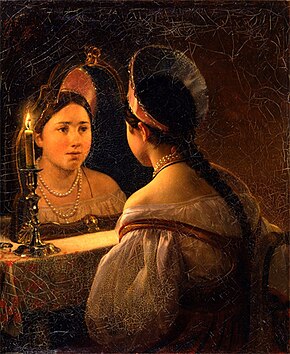
Back وعي ذاتي Arabic Consciència de sí mateix Catalan Sebereflexe Czech Cohibición Spanish Eneseteadvus Estonian خودآگاهی (روانشناسی) Persian מודעות עצמית תכונתית HE अत्याधिक आत्मचेतना Hindi Éntudat Hungarian Ինքնագիտակցություն Armenian

| Part of a series on |
| The Self |
|---|
| Constructs |
| Theories |
| Processes |
| Value judgment |
| As applied to activities |
| Interpersonal |
| Social |
| Politics |
Self-consciousness is a heightened sense of awareness of oneself. It is not to be confused with consciousness in the sense of qualia. Historically, "self-consciousness" was synonymous with "self-awareness", referring to a state of awareness that one exists and that one has consciousness.[1] While "self-conscious" and "self-aware" are still sometimes used interchangeably, particularly in philosophy, "self-consciousness" has commonly come to refer to a preoccupation with oneself, especially with how others might perceive one's appearance or one's actions. An unpleasant feeling of self-consciousness may occur when one realizes that one is being watched or observed, the feeling that "everyone is looking" at oneself. Some people are habitually more self-conscious than others. Unpleasant feelings of self-consciousness sometimes become associated with shyness or paranoia.
Notable opponents of self-consciousness include Thomas Carlyle.[2][3]
- ^ Richard P. Lipka/Thomas M. Brinthaupt Self-perspectives Across the Life Span, p. 228, SUNY Press, 1992 ISBN 978-0-7914-1003-5
- ^
Cowlishaw, Brian (2004). "View-hunting". In Cumming, Mark (ed.). The Carlyle Encyclopedia. Madison, New Jersey: Fairleigh Dickinson University Press. p. 481. ISBN 9780838637920. Retrieved 21 October 2023.
Thomas Carlyle disagreed with the maudlin self- consciousness of British Romanticism.
- ^
Timko, Michael (18 June 1988) [1988]. "Prophetic Utterances". Carlyle and Tennyson (reprint ed.). Basingstoke: Springer. p. 175. ISBN 9781349093076. Retrieved 21 October 2023.
'[...] Carlyle's work-ethic and his concomitant insistence on self-forgetfulness were only the most extreme of Victorian reactions to an immobilizing self-consciousness. [...] Carlyle's principle of anti-self-consciousness was one of the discoveries which led him out of his mental crisis.'